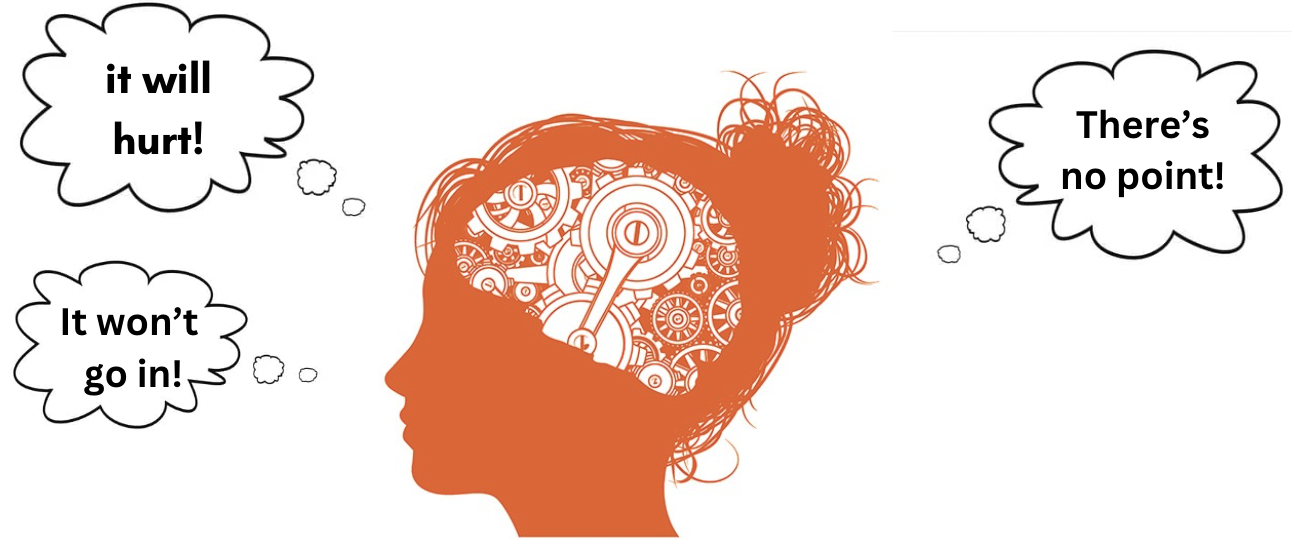Is Vaginismus psychological?

If you are like so many women who suffer with vaginismus, a question you will have pondered is 'is vaginismus psychological or physical?'.
If you’ve ever wondered why something that feels so physical can be so deeply influenced by how you think and feel, you’re not alone.
Many women ask me this very question after months or years of feeling frustrated and let down by their bodies.
And I totally get it: vaginismus seems like a purely physical response, but the mind plays a huge role. Even the expectation that penetration will be difficult can cause you to tense your muscles in anticipation of pain - or avoid it completely.
Although the end-product of vaginismus is physical (the pain, the “wall”, etc.), its roots are always psychological and emotional. It can come from something as simple as feeling disconnected from your vagina, or from fear of pain, failure, or the unknown. Nothing scary or deep-rooted - I promise.
These emotions cause your vaginal muscles to tense… and trying to insert anything through tightly clenched muscles will understandably hurt. Or, as many women find, you may not want to try at all.
A clear sign that your mindset is sabotaging your progress is when penetration exercises feel painfully slow or inconsistent. Or perhaps you’re exhausted at even the thought of picking up your dilators.
The huge impact that mindset has on vaginismus surprises many women - especially as they would really love to have sex and they're body is just not complying.
This is why any treatment should focus upon managing your feelings around vaginal penetration (www.nhs.uk).

Recognising the psychological element to vaginismus is usually the most important, step toward overcoming it.
Because if you believe the problem is purely physical, it’s easy to feel hopeless, “broken”, or abnormal. Please let me reassure you that you’re absolutely not!
But the truth is that understanding mind/body combination is often the missing piece that helps everything finally click. When you start to see how your thoughts, emotions, and expectations shape what happens in your body, vaginismus becomes far less confusing - and far more solvable.
It's entirely understandable why you might attribute your vaginismus to having a physical abnormality: believing that your vagina is too narrow or too shallow for penetration, or that there is a 'wall' in the way.
It is easy to understand why the poor vagina is taking the blame here! After all, it’s a visible, tangible body part that you can see and feel. Our thoughts and mindset, however, are not.
The fact that your vaginal muscles are tensing is the END RESULT of a process that starts in the mind. This explains why purely physical treatments for vaginismus often fall short.
Many women with vaginismus have undergone unnecessary operations on their genitals, only to discover that the vaginismus persists after the surgery.
Here's what Julie, an ex-vaginismus sufferer said about her experiences of this...

Julie, 20
"I felt helpless and defeated. I was 19, and had been trying to overcome my vaginismus since the early age of 14 – having met countless gynaecologists, researched the condition endlessly, and even gotten my hymen surgically removed by a top gynaecologist to “rule out any physical abnormalities”, which was entirely unnecessary.
However, I was still sceptical to begin the programme, convinced there was no “psychological” cause to my condition: I believed it was a physical reaction I had zero control over – and I didn’t want to be disappointed yet again. A few weeks later, I was a) mind-blown and b) severely proven wrong, when I realised the impact of my thinking, beliefs, and fears in sustaining vaginismus."
What blushing can teach us about vaginismus...
Vaginismus shares much in common with a number of other psycho-somatic (ie, mind/body) symptoms. On the surface, they may appear very different from vaginismus, but dig a little deeper and they're actually very similar.
Take blushing: When you blush, your face isn’t doing it “on purpose.” but your body is responding to you feeling embarrassed or on the spot. We don't blush when we're sat comfortably on the sofa, eating snacks and watching Netflix.
Vaginismus involves the same kind of mind-body response - it just happens in a different part of the body. When there’s fear, pressure, or anxiety around penetration, the vaginal muscles tighten up. It’s not something you’re choosing or doing wrong. It’s your responding to the way that you feel.
There are so many misunderstandings around vaginismus - including from medical professionals. This is what Dr Suzi had to say about vaginismus being psychological...

Dr Suzi, 41
"As a GP I felt I should have understood vaginismus. I had tried all the "physical" routes as I believed this was the underlying problem, including the local vulval pain clinic, pelvic physiotherapy, I was even about to book private Botox treatment!
"I dismissed the Vaginismus-Free Programme quite a few times because I did not believe that for me, there was any psychological basis to my problem. I began to wonder whether I had been totally misinformed all this time about vaginismus and decided to give it a go.
I am now confidently transitioning to sex. I would advise trying this programme, to anyone who believes, like I did, that nothing will work"

In this video, I describe the THOUGHTS and BELIEFS that drive the physical response of vaginismus
The Vaginismus-Free Programme - the ultimate psychological AND physical vaginismus treatment
As much as vaginismus may feel like feel like something that is completely unconscious and involuntary - YOU CAN LEARN TO TAKE CONTROL OVER YOUR MIND AND BODY!
Overcoming vaginismus requires a mental skillset that any woman can learn.
Take the first important step to being vaginismus-free by clicking below...
Would YOU love to overcome vaginismus?
Book a free, friendly Zoom consultation with me to find out more
We’ll talk about where you’re at, what you’re hoping for, and if the Vaginismus-Free Programme is a good fit for you.

Relaxed and friendly 30 minute Zoom chat
Ask any questions - nothing is off-limits!
Completely confidential
I'm sure you'll come away feeling reassured, hopeful and feel much more positive mind about your future.
